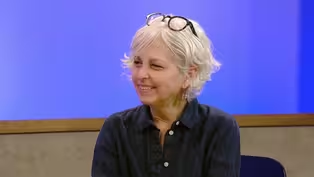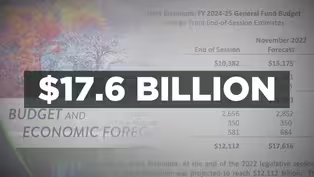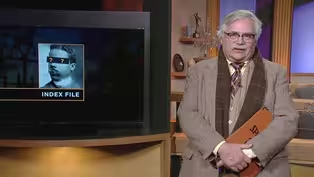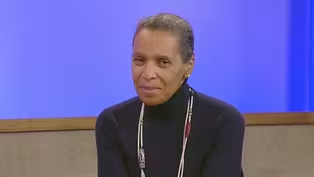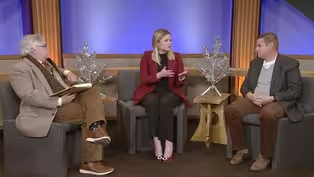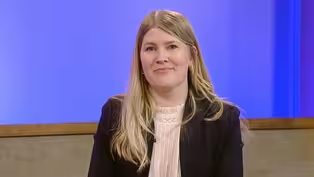
Big budget surplus, Winter Weather, author Kate DiCamillo
Season 2023 Episode 14 | 56m 54sVideo has Closed Captions
Historic $17.6 billion surplus, Winter Weather, Proposed Nickel Mine, Kate DiCamillo
Historic $17.6 billion state surplus, Paul Douglas gives the odds on the White Christmas, Kaomi Lee explores a proposed nickel mine up north, Award winning children’s author Kate DiCamillo, Political reporters preview legislative session with a big surplus and one-party control.
Problems playing video? | Closed Captioning Feedback
Problems playing video? | Closed Captioning Feedback
Almanac is a local public television program presented by TPT

Big budget surplus, Winter Weather, author Kate DiCamillo
Season 2023 Episode 14 | 56m 54sVideo has Closed Captions
Historic $17.6 billion state surplus, Paul Douglas gives the odds on the White Christmas, Kaomi Lee explores a proposed nickel mine up north, Award winning children’s author Kate DiCamillo, Political reporters preview legislative session with a big surplus and one-party control.
Problems playing video? | Closed Captioning Feedback
How to Watch Almanac
Almanac is available to stream on pbs.org and the free PBS App, available on iPhone, Apple TV, Android TV, Android smartphones, Amazon Fire TV, Amazon Fire Tablet, Roku, Samsung Smart TV, and Vizio.
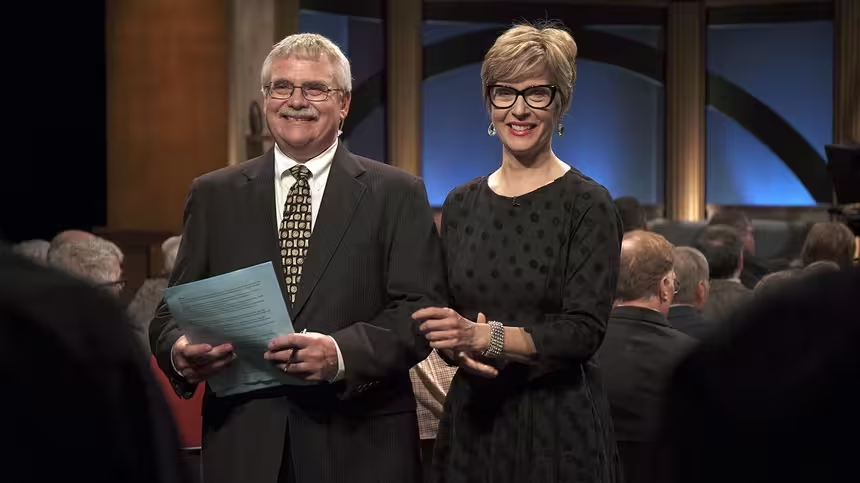
A Minnesota Institution
"Almanac" is a Minnesota institution that has occupied the 7:00 p.m. timeslot on Friday nights for more than 30 years. It is the longest-running primetime TV program ever in the region.Providing Support for PBS.org
Learn Moreabout PBS online sponsorship- [Narrator] "Almanac" is a production of Twin Cities PBS for the stations of Minnesota Public Television Association.
- In the next hour, we'll talk with Minneapolis School Board Chair, Kim Ellison, about the district's looming fiscal crisis, Paul Douglas gives us the odds of a white Christmas.
children's author, Kate DiCamillo, shares her new book, and Mary Lahammer details the historic $17.6 billion state budget surplus.
- [Mary] With another bigger record budget surplus, we'll explore what one-party control at The Capitol could mean for this nearly $18 billion of extra funds.
- There's golden opportunities for us to do things on so many fronts.
- That's coming up on "Almanac".
(upbeat music) - [Narrator] "Almanac" is made possible by members of this public television station.
Support is also provided by Great River Energy, providing wholesale power to 28 Minnesota electric cooperatives, Delta Dental of Minnesota Foundation, improving oral health while advancing social equities, deltadentalmn.org/tpt the Shakopee Mdewakanton Sioux Community, a tribal nation focused on community and collaboration, especially in times like today.
And Education Minnesota, the voice for professional educators and students throughout the state.
More at educationminnesota.org (upbeat music) - A lot to cover on the show tonight.
Cathy, taking the night off, and I'll have a winter weather check with Paul Douglas.
Kaomi Lee takes us to a Northern Minnesota community that could end up helping the electric car industry.
Political reporters will join me at the table.
But first, the big news out of the week came from the State Capitol and another state budget forecast, an historic number.
The state surplus has grown to nearly $18 billion.
The State Budget Director will be here in just a few minutes with more on where the money came from, where it might go.
But first, Mary Lahammer has details on the surplus and how the governor and DFL-controlled legislature wanna spend it.
- As we move forward into the next legislative session, Minnesota remains in strong financial position with a solid labor market.
Minnesota remains resilient, and our budget outlook bright.
- [Mary] The financial outlook is beyond bright with almost $18 billion in the projected budget surplus.
- We're setting on some historic record numbers, from historic record unemployment to surpluses, and I'll remind Minnesotans, during the term of the Walz-Flanagan administration, we have not raised taxes, we lowered them.
- [Mary] One of the ongoing issues with all this success is attracting enough workers to the cold state to keep fueling the hot economy.
- One thing that we know for certain is that we need more workers in Minnesota, that we have a tight labor supply and extraordinarily low unemployment.
- I think it's making sure, again, that housing is affordable.
I think we have to have a conversation, as we've said, around public safety and understand what that looks like in the long run.
I think things like paid family leave and access to childcare, protecting our natural resources and the ability for people to be able to enjoy those things, and continuing to make a diverse economy no matter where you come from, religion, race, ethnic background, that you feel welcome and safe in Minnesota.
- He can propose his budget and we will have a thorough conversation and probably some hearings on the issue.
- [Mary] With so many new legislators, these new leaders seem reluctant to take many policy positions.
Democrats had been cool to some tax cuts and still seem uncertain.
- We've been very consistent in the things that we've been passing that have gone over to the Senate to meet a quick death.
So we're really excited now to have a partner in the Senate who's going to be able to work together on many of the priorities we share with the Senate and the governor.
And you mentioned paid family medical leave.
That was something the governor mentioned.
That will certainly be a priority.
We've talked about investment in K-12, fully funding education.
Early care and learning is also a high priority for us.
Investing in housing, investing in infrastructure, tackling climate change.
- [Meryl] Climate change is a top issue for the new House leader.
And with record diversity, equity and inclusion will get a holistic approach in all investments.
- We know that we have deep, deep disparities in almost every area that we're looking at, right, from housing, education, I mean, everything that you can think of, we absolutely need to invest in equity.
And so that's gonna be one of our top priorities, and we're really thinking about it in a more holistic way.
So not specific bills that address equity, necessarily, but making sure that it's a part of our entire thought process and our work process as we go forward.
- While Democrats have complete control over state government, in the Senate, Republicans are just one vote away from a majority.
They didn't provide a reaction here, but said tax relief is imperative.
House Republicans' new leader said she can work with Democrats on several important issues.
- We know that we need affordable housing across the state in greater Minnesota and in the metro areas too.
That issue of childcare, or the lack thereof, hits all parts of our state.
- [Mary] Republicans will only be needed on a bonding bill to build a super majority.
- The era of gridlock is over.
We have a trifecta now that the voters have delivered.
We have the ability, I think, to move big things, and we're going to be really focused on what can help Minnesotans afford their lives when we know that many are still struggling.
- [Mary] But the competition for funds will be fierce, and much of the money is one-time, thanks to federal spending and inflation, which is not included.
- We will use this tremendous opportunity to help Minnesotans afford their lives.
We won't walk away.
We were elected to lead and we will get things done.
- 18 billion is a big number, for sure, but the vast majority of that is one-time.
And so if we're thinking about the ongoing structural surplus, and that's 6 billion a year, roughly.
But if you take inflation into account, it's about 5 billion a year.
So we don't have the surplus that it might appear from a number like 18 billion on an ongoing basis.
- Hearing a $17.6 billion surplus was a little jaw-dropping.
That was shocking to hear.
We know that Minnesotans are being overtaxed.
Money that could be kept within Minnesotan families to help with high grocery prices and with high energy bills, that money needs to go back to Minnesotans.
- These were competing ideas that were put in front of Minnesotans and they chose to go with us.
- [Mary] Walz wants rebate checks and social security tax repeal for all but the richest Minnesotans.
- The only door I closed on this is I'm not gonna give a cut at those top levels.
That's not gonna happen.
- [Mary] With the largest surplus estate has ever seen, education, paid parental leave, tax cuts, public safety, transportation, environmental investments, are all possible.
- I'm excited about this.
There's golden opportunities for us to do things on so many fronts.
(upbeat music) - Joining me now with more of Minnesota's budget situation is the State Budget Director, Ahna Minge.
Welcome to "Almanac".
- Thanks, Eric.
- How did this happen?
This is an enormous number that has people just sort of slack-jawed.
How did this happen?
- A lot of it wasn't a surprise.
We ended the last legislative session, and we knew at the time, that if no spending was passed, we'd have about $12 billion in the current budget biennium, '24/'25 biennium.
So going into this forecast, our starting point wasn't 0, it was 12.
- [Eric] 12 to the good.
- 12 billion to the good.
And so, then, the question is how do we get from 12 to 18?
It's not nothing.
So we sort of shifted the starting point.
So a few things happened.
One is we collected more revenue than we thought we would, but most of that we also sort of saw it coming, to an extent.
MNB monitors collections, the revenue that the state brings in, and we brought in about $3 billion more in fiscal year 2022 than our last forecast had anticipated.
- And with less spending for education and human services?
- [Ahna] That's right.
- That kind of dovetails with the situation.
Why is it important for viewers of the program to know that 1/3 of the money is continuing ongoing and 2/3 of the money is one-shot, one-time revenue?
- Because I think it's really important, and you'll hear MNB talk about this a lot, but when we think about the long-term ability for the state to deliver on the services and the promises it makes to Minnesotans, we wanna think about our ability to support those in the long-term.
And so we know that of the $18 billion, 12, it's sort of one-time money.
And so that 6 is the structural balance.
And then, when you look out two more years, 'cause we do a four-year budget forecast.
When you look at '26 and '27, we'll have about $8 billion in what we call structural balance, and that's how much can support ongoing spending.
And so our goal is to line up permanent spending with permanent resources.
Because if we spend one-time money on permanent things, that means, eventually, we won't be able to keep delivering services with existing revenues.
- And I suppose it's important to know that it's 31 months out.
This is a forecast.
And what are the headwinds that potentially could reduce that 17 point, whatever it is, number?
- Well, so we use macroeconomic forecasts from our national national forecaster, and they are forecasting a sort of a mild 3/4 recession in the next year, and that's baked in already, but it's a forecast, and there's a lot of stuff going on in the economy right now.
So there are risks that inflation may or may not sort of come in line the way that our forecast expects, and that has implications for both state spending and state revenues.
There are risks about changes in monetary policy, which could also affect the economy.
And then, we're still relying on forecasted revenue in some volatile sectors, like forecasts of corporate taxes or forecasts of capital gains, both of which are pretty hard to predict, especially right now.
- [Eric] If they're volatile.
- Yeah, that's right.
- We're gonna hear a lot about inflation, and as it pertains to state spending.
Give us a little primer to the audience about, what's that all about?
- So this is something that I think about a lot.
So our budget forecast, we project what we're gonna collect and what we think we're going to spend.
But when we forecast tax revenue, we incorporate the fact that prices are gonna rise.
But when we forecast state spending, we don't account for the fact that the cost of delivering services is going to rise.
And so that means our forecast, essentially, assumes that state services are going to erode and that we won't be able to deliver some of those services over time at the level that we do right now.
- It didn't mean much when there was 2% inflation, but if it's 8%, that's a big number then.
- Yeah, it is a big number, and even 2% is a big number.
So on forecast day, we always do an estimate of what is the cost of inflation in future years.
So when we look at '24 and '25, the years we're gonna budget for this year, we estimate that, in future inflation, which we think will be around 2, 2.5%, that alone will cost $1.5 billion.
And then, when you look out to '26 and '27, and it accumulates over two more years, that's another 3 to $4 billion.
And that's not even accounting this 8% inflation we had in the last two years.
- Complicating factor.
Well, we look forward to the governor's budget on January 24th and your good work in on behalf of that.
So thanks for coming over.
- Thanks so much.
- You bet.
Nice to see you.
We have a lot more show tonight, including a visit with author Kate DiCamillo.
Stick around while we switch out our guests.
Coming right back.
(upbeat music) We turn now to a forecast of another kind.
Will this winter be colder or warmer than average?
How long will it last?
More or less snow than normal?
And the all important question of this time of year, will we have a white Christmas?
Here to help us sort out all these weather winter inquiries, Paul Douglas.
He owns his own weather company, Praedictix.
Regularly shares his weather knowledge with readers of the "Star Tribune", listeners of WCCO Radio, and of course, right here on "Almanac."
And this week, you're the king of the Poconos.
- The king of the what?
- Poconos.
Aren't you in Pennsylvania, or we can't say that?
- Yeah, I'm in Amish country.
No, I'm with my 92-year-old dad in Lancaster, Pennsylvania.
- Oh, that's great.
- Celebrating an early Christmas, and just hanging out, keeping an eye on him, giving my sister a break.
She lives about two blocks away.
- Can you provide some visuals even though you're remote?
- I was working on visuals all day.
My elves were very busy.
- Go for it.
- Working on graphics.
Let's start out with a little snow update.
Finally, snow lovers, fairly optimistic.
Usually, they feel cheated this time of year.
But we have a really good start for Minnesota snow lovers, especially in the Twin Cities.
15 inches of snow so far this year.
Average to date is closer to 10 1/2.
Last year, we only had a poultry 3.7.
So does this mean it's going to be a crazy, pioneer winter with tons of snow?
No, it just means our weather is volatile and random.
15 here, 22 up in Duluth, about 17 1/2 international falls.
Here's the departure from average to date.
And you can see that surplus, here on the metro, almost 5 inches.
But elsewhere around the state, a slight deficit in terms of snowfall.
The big story continues to be the drought.
And I fear, I'm gonna be using the D word well into 2023.
I hope to be proven wrong.
We've had just over 21 inches of precipitation this year.
Normal to date is almost 31 inches.
So higher math, what is that?
About a 10-inch rainfall deficit from where we should be.
That white line is where we are in 2022 in terms of precipitation over time.
The line below is the driest year on record, 1910, when we had just about 10 inches of precip the whole year.
And ironically, it was just three years ago, 2019, that light blue line up above, when we set all kinds of records for the wettest year.
So talk about weather whiplash.
It's gonna take a long time, I think, to pull out of the drought.
This is not going to happen overnight.
And yes, heavy snow will help, when it melts, to replenish lake water, water in our rivers.
Soil moisture, a different beast.
And hopefully, we get a very wet spring next year.
That would certainly help.
But yes, extreme drought is hanging on.
Could be a little bit of freezing drizzle mixed with wet snow on Saturday.
Temperatures just above freezing by 10 or 11 in the morning.
So I think most major roads just wet tomorrow.
Then, we get a break Sunday and Monday.
And the rumors are true.
A significant storm brewing for next week, next Tuesday, Wednesday, and Thursday.
Still pretty far out there.
So it's early for specifics.
But this storm will track in from Denver, tapping moisture from the Gulf of Mexico, and it looks like enough warmth for a rain-snow mix in the metro on south, and that will keep the amounts down.
But far norther Minnesota, far western counties out near the Dakota line, this could be very plowable.
8, 10, 12 inches or more.
The North Shore could get buried under a foot and a half of snow from the system, but I think less here in the metro.
A slight wet bias the rest of December, January, and February, according to our friends at NOAA.
And based on the ongoing La Nina cool phase in the Pacific, a slight cool bias.
Will we see a polar vortex?
I don't pretend to know what will happen in January, but much of the east and southern U.S. forecast to be quite a bit warmer than average.
If you don't like the cold and you don't like the darkness, consider this: in just 17 days, daylight will start to increase again for the first time since, what?
Late June.
So little bit of good news there for folks.
And yes, Eric, 7 out of 10 Christmases are white in the Twin Cities, meaning at least an inch of snow on the ground.
Duluth, International Falls, the Range, it's more like 100%.
4 out of the last 6 have been white.
I think the odds are in our favor, but how white remains to be seen.
- Well, best of wishes to your father, and you can tell him that you brought the Minnesota audience tidings of comfort and joy.
- Very nice.
- Paul Douglas, everybody.
- I will pass that along.
- Thanks, man.
- Thank you, Eric.
- Happy holidays.
- Happy, happy.
(upbeat music) - I had to get to the doctor this week and ask for some stronger medication.
Not because I'm 50 years old and going through menopause.
Honey, it's because the way these Vikings are playing every given Sunday, my blood pressure skyrockets.
These last-minute wins, overtime games, incredible, one-handed catches are sending my numbers through the roof.
By the end of the game, I'm dizzy, I'm lightheaded.
I need a drink.
I'm watching in my living room, but I'm panting and sweating like I've been on the field and I just played two downs on defense.
Listen, if I'm gonna stay healthy, I need Kevin O'Connell's team to either win by 30 or lose by 100.
Can y'all give me a boring, one-sided game for just one week, please?
'Cause all the back and forth is giving my blood pressure the blues.
I'm serious about my health.
So I marched down to the Vikings headquarters to talk to the person responsible for all the success the team is having, Justin Jefferson.
I pleaded with him to stop being so fast and fabulous, because this season has already shaved five years off my life expectancy, and I'm sure other folks are being impacted as well.
Turns out his on-the-field acrobatics are causing his blood pressure to go up too.
- Let me tell you something.
I've been so scared of my damn blood pressure.
- Scary too!
- Man, my poor blood pressure.
Well, I guess we're all in this together.
Go Vikings!
Skol!
What them numbers looking like?
- They're rising.
(upbeat music) - President Biden wants half of all vehicle sales in the U.S. to be electric in just eight years, but the domestic supply chain for those vehicles, or EVs, still lacks a lot of infrastructure.
Reporter, Kaomi Lee, found that a possible mine in Minnesota could play a major role.
But at what cost?
- [Kaomi] This fall, the Biden Administration awarded $2.8 billion to build an electric vehicle supply chain in the U.S. - Now, we're choosing to build a better America, an America that's confronting the climate crisis with America's workers leading the way.
And we're rebuilding the economy, a clean energy economy, and we're doing it from the bottom up and the middle out.
- [Kaomi] A big part of that supply chain could start here in Northern Minnesota, in a town west of Duluth called Tamarack.
Population: 62.
A company called Talon Metals has been exploring 2,000 feet underground for high-grade nickel.
- What I'd like people to know is that this resource, the Tamarack Intrusive Complex, which is about an 11-mile-long geology formation, geologic formation, is really special and really rare.
- [Kaomi] How rare?
Todd Malan is Chief External Affairs Spokesperson for Talon Metals.
He says, in the last decade, it's one of only three sites discovered in the world with this high of grade.
- We'll be mining 1,500 to 2,000 feet underground.
We'll be able to mine in a way that's very surgical.
Because we now understand the ore body, because we've been doing all of this drilling, and we'll be able to actually take more out of the ground at high grade that then can be mixed in with lower grade material and give Tesla what they need.
- [Kaomi] Nickel is a critical component of electric car batteries.
It's one of the reasons that demand for nickel is at an all-time high globally.
And the higher the grade, the longer the battery life.
That's why Tesla has ordered 75,000 metric tons of nickel concentrate.
Talon will ship to Tesla by 2026.
Malan says it's enough for 1.6 million batteries.
- We think we're doing something really new and different in terms of mine development.
One of the things we did is years of quarterly meetings with the community, with NGOs, with tribal sovereign governments, and trying to get their concerns because we're in a phase where we can shape the project to actually try and address some of those concerns.
- One change is to process the nickel out of state.
Like a nickel mine in Michigan, Talon plans to use rail cars to move the ore to an industrial site in North Dakota.
The Biden Administration has pledged $120 million.
This also shifts some of the mine's regulatory hurdles out of state.
No one has seen Talon's plan yet, and environmentalists are skeptical.
- The history of this industry is challenging.
There is a long, nearly unbroken history of water pollution across the globe at similar operations that mine sulfide ores for nickel or copper.
There's a lot of political pressure, I think, to push these proposals forward and not give them the scrutiny that they deserve.
- The Mille Lacs Band, we have a unique connection to the land.
Our culture relies on clean water.
- [Kaomi] The Talon mine site is located within just a few miles from two major watersheds.
He says potential pollution could adversely impact sacred practices like wild rice gathering.
- In our culture, we have this belief and this way of practice that we look for seven generations to preserve our climate, our environment for those future generations that are coming.
That is the ultimate goal is to protect this and hand this down to our future generations for our people.
- Talon is currently looking at several ways to decarbonize its mine operations.
One way is through something called carbon mineralization.
Malan says it's partner, Rio Tinto, is doing lab experiments on converting carbon gas to rocks.
- That is about this idea, similar to what they're doing in Iceland, where you would inject carbonated water, basically a Perrier, and inject it in the ground and let that natural reaction happen.
- [Kaomi] He says it's too soon to tell if this could work at its Tamarack site.
Harvey Thorleifson is the state geologist.
He says there's some merit to the science.
- Any activity will have consequences.
Any construction activity could affect water, and landscape modification is very significant in certain places, given our commitment to landscape preservation.
Nothing will be taken for granted.
There will be impacts and we, the people, need to decide whether there's a net benefit.
- The Band is very much in support of moving towards a cleaner environment that uses less carbon.
However, the notion of mining nickel fresh from the ground should not be the first option or only option.
There are ways to recycle the metals that we have.
- [Kaomi] Both the Band and Talon agree on the need to transition to green energy, just not how to get there.
Talon will present its proposal to state regulators in March.
(upbeat music) - [Narrator] "Almanac" is a production of KTCA Channel 2.
- Good evening.
I'm Joe Summers, and welcome to "Almanac."
If you're a Minnesotan interested in what's going on in the state, in its arts and media, sports and public affairs, then we, here at Channel 2, hope that you will become a lot more familiar with this name, "Almanac."
Because every week, we hope you'll spend this hour with us, sit back, try to better understand this week's events with a little perspective and maybe even a little bit of humor.
(upbeat music) - It's a yearly tradition at "Almanac."
Often, right around this time of year, award-winning children's author, Kate DiCamillo, joins us to share a new book and spends a bit of time sparring with us along the way.
Kate's latest release is a holiday book, featuring Mercy Watson.
So Kate, toast is involved.
- Yes, toast is involved.
I want everybody to know that Eric and I have been up here having a wonderful chat.
And now, come the hard questions.
He's been very sweet to me.
But now, we're gonna be talking about toast.
And two pages a day, right?
Well, that's probably in there.
- Well, it took you 16 days to knock this thing out.
I mean, come on.
- See, I knew it!
See, you wrote it down.
You did the math.
You were prepared.
It was a little bit longer than 16 days, but I... You know what?
Go ahead.
Yes, 16 days.
16 days to tell the story of a pig that goes caroling.
- This is the book.
It's "A Very Mercy Christmas."
- I like a merry Mercy Christmas, though.
- Actually, I like that quite a bit.
It's too late now.
- Well, there's always next time.
So you've got Stella.
She can't find an adult to help her out caroling, and here comes the zoo in, Mercy the pig and a horse and a cat.
- Right, right.
The adults are busy, and Eugenia, who's always busy and always grumpy, she wants nothing to do with Caroline, but the animals are all up for it.
- I don't wanna spoil the end of it, but I want you to talk about the really nice Chris Van Dusen illustrations, man.
How'd you two get going together?
- Well, the publisher found Chris.
I didn't meet him until we were into the third book of this, and there are a lot of Mercy books now.
But this could not exist without him.
And he, actually, the end of this book, which we're not gonna talk about, even though it's not much of a surprise.
- Well, I don't think we should tip it.
- No, no.
I mean, we don't wanna give it away.
It's a real cliffhanger.
- Yeah, for sure.
But he makes this very, very beautiful, two-page spread of everybody together, animal and human being.
- Well, take us behind the scenes of the publishing industry.
March 1st comes along and you're publishing house calls, and says, "Hey KD, what have you got for Christmas?
We need some product."
Is that what we got going here?
How does it work?
- In your world, that's how it goes.
'Cause in your mind it took me 16 days to do it.
So it's like, "Oh, yeah, you need something for Christmas?"
Do you know how long that took?
It took forever.
- But who comes up with the idea?
The publisher calls you or you call the publisher?
- Oh, I'm sitting there alone in front of the computer, and I'm not calling the publisher.
I'm just like doing a caroling pig and writing about it and laughing to myself in the wee hours of the morning.
And then, after a while, I send it to my agent, who then sends it to my publisher.
And they go, "Yeah, that's all right.
We'll publish that."
That's how it happens.
But that was like...
I don't know, I think that was four years ago.
That's how long it takes to make a picture book.
- And you're using recurring characters.
- Yeah, which is really fun.
- Is that easier or harder?
- There's a part of me that would be happy just writing about Deckawoo Drive, where all of this takes place, and the people and animals on Deckawoo Drive and toast.
There's a part of me that would be happy doing just that for the rest of my life.
But don't worry, I'm doing other things too.
But it is so much fun to visit these characters, to watch them grow or not grow.
For instance, speaking of growing, Eugenia, who is perpetually grumpy...
I'm gonna give it away.
She smiles by the end of the book.
- It's up in the corner, and it's kind of a smile.
- Right, it's kind of a... See, but you noticed it!
You noticed it.
- I follow your work religiously.
Are you kidding?
- Yeah, okay.
What one other hardball questions do you have?
- Are you going long form now, coming off of this more modest length of piece?
- Yes, I'm working on a novel, and I also just turned a novel in.
But it all takes a while.
- Any of this going to the silver screen?
- Well, the last book is gonna go, "The Beatryce Prophecy" is gonna go to the silver screen.
- And the opera, how's that going?
- The opera was an amazing, amazing thing.
I'd looked for you there and I didn't see you.
- We were gonna go and something happened.
- I looked and looked.
I was really kinda sad.
- [Eric] My loss.
- Why wouldn't you want to see an opera about a rabbit?
- Is it on Netflix or one of the streaming services?
- No, but let's keep our fingers crossed.
And speaking of Netflix, "Magician's Elephant" will be on Netflix next year.
So that'll be fun.
- How close are you to your audience when you sign books or see somebody at an airport or something?
- It is the most thrilling thing in the world to talk to a kid who read a book that it took me eight days to write.
- 16 by my count.
- Right, right, that's right.
You said 16.
There's nothing better than that.
- [Eric] I bet it's cool.
- It makes me feel like the luckiest person in the world.
Okay, you're done talking to me now, 'cause you're holding up the book.
- Well, yeah, as I'm getting to wrap.
But come back and see us when you got more product to push.
Will you?
- All right, I will.
Thank you.
- Thank you, Kate.
- All right.
(upbeat music) - Last week, Minneapolis public school officials called attention to what they say is a looming fiscal crisis.
Officials say declining enrollment, paired with federal pandemic assistance that expires in 2024, will leave the district with a significant deficit in less than five years.
Dealing with this financial crisis will fall to a school board that has five new members, starting in January, and a new superintendent who is expected to be in place this summer.
Kim Ellison chairs the Minneapolis School Board.
Delighted you could come over.
How did the district get into this situation?
- Well, we've been hearing from our chief financial officer.
He's been talking about, going the status quo, will send us to this point where we are operating as if we have 50,000 students and we have about 29,000 students and it's not sustainable.
- You've been hesitant, you as a board, not you as an individual, to close schools.
Why is that so difficult?
- Closing schools, it's hard on families.
It's hard on neighborhoods.
It's hard on the city.
And so to close schools, we wanted to make sure that it's the last step.
So we redrew lines, and we said, "Okay, students, you're gonna go to your neighborhood school," thinking that if that school could attract all the students within that attendance area, they could be sustainable.
And then, the pandemic happened.
We lost more students.
But now is the time for us to go back and look, did that happen, did that work?
Did they attract the students that they need, and will they be sustainable?
- Is it part of the problem, maybe it's a big part, is that there are just fewer kids living in Minneapolis?
- There are fewer kids living in Minneapolis, but we need to adjust for that.
We can downsize the district.
There are things that we need to do with the district, make changes, but we need other governmental officials to help us.
We need more affordable housing in the city.
We need the state to fully fund special education.
That would be helpful.
- What would the number be from Minneapolis on the special education piece?
- From the special education, we're looking at $18 million.
- Well, that doesn't sound... - It doesn't sound like a lot.
I mean, that's our subsidy.
That's what we're underfunded.
- A lot of the school districts are looking at a 5% increase in the formula per pupil funding formula this year and then another 5% next year.
And of course, the funding formula is based on enrollment.
So are you losing money as the population of students declines?
- Yes, yes.
- And the impact of that is part of the issue, I guess.
- That's a huge part of the issue.
But we're not gonna fix this just by increasing enrollment.
We need to downsize some of our spending.
And so we're gonna be looking at that, as a board, our administration, 'cause we just passed a strategic plan too.
We're gonna make sure that we're spending money on our strategic plan, that if we're spending money, that it's going toward something that we've planned for.
- Do you find that the district lacks credibility when you talk to stakeholders?
There's been so many ups and downs with the district.
- Yeah, I mean, it depends on who you're talking to.
If families love their school, and so if we're talking to families about schools, those are nice conversations to have.
But the district has made some missteps and we have lost credibility with some of our community.
- Let's end by talking about the disparities, math and reading scores.
I'm sure it breaks your heart to see the numbers.
- Yes.
- Is there something that can be done, or it is what it is?
- No, there's something that can be done and we need to do it.
But with this pandemic, I mean, if we talk about the learning loss, where our students that were struggling before are struggling even more.
They fell further behind than other students did.
But we definitely have something that we can do.
We've passed a strategic plan that we're thinking will address, and part of our strategic plan was closing that gap between our white students and students of color.
And so we're gonna be intentional about that, and I think that will help.
- When do you put a budget on the table?
- We need to have a budget by June 30th.
- And you've got five new members.
- And we've got five new members.
- How's that gonna affect things?
- I'm excited about it.
They've got a lot of work to learn quickly.
We need to hire a permanent superintendent.
- That's in the summer?
- Well, we've started doing community engagement now to set a profile of what that superintendent looks like.
We want to hire somebody by early spring to start by July 1st.
So yes.
And then, we also start teacher negotiations again, contract negotiations with our teachers.
- Never stops.
- It never stops.
- Thanks for coming over.
Good luck to you.
- Thank you so much.
- You bet.
(upbeat music) - Just what will the DFL trifecta do with the nearly $18 billion state budget surplus?
Can they manage to get along amongst themselves to spend this historic amount of money?
Let us ask a couple of political reporters what they've been hearing about this week.
Brian Bakst toils away in the hallway of the State Capitol for MPR News, and we welcome to "Almanac" Caroline Cummings from WCCO TV.
Caroline, what has struck you about reaction from the governor and legislative leaders following this really jaw-dropping news?
- Well, the wishlist is long and it is conflicting in some areas, or I should say there's competing priorities.
So I think the biggest takeaway for me when the news came down was, that's a lot of money and a lot of it one-time money.
So wrestling the DFL's ideas for long-term investments.
They set a lot on the campaign trail, fully fund education.
That's gonna throw a little bit of a wrench in the mix if $12 billion of it is one-time money.
And also, two, we got a little glimpse into some of the fishers in the DFL new caucus when some of the leaders kind of tempered down expectations about social security, income taxes, fully cutting social security taxes.
And then, some of these new members saying, "We ran on this and that is our top budget priority."
- I think a lot of listeners, viewers wanna know, how much am I getting back from $18 billion?
Is that clear yet, or is that still to be determined?
- It's not clear.
The governor said that he's gonna put his Walz check or rebate check proposal back on the table.
And if you remember, he wanted to send $1,000 per individual and $2,000 per family up to a certain income level.
So not everybody would get it, but a lot of folks would get that money.
That didn't go anywhere last year.
He says he wants to do it and do it fast.
And I think that that, potentially, gets more currency, given that a lot of this, as we've talked about, is not recurring money.
So things that have a one-time expense are gonna kind of rise on the list and things that have an ongoing cost are gonna face more competition for those remaining dollars.
- I've been told one of the big differences between the house and the Senate is that the house is up every two years for reelection, impatient to get stuff done, and the Senate is four years, more patient.
Is that what we're gonna see you?
Is the Senate gonna be kind of a moderating factor on the house as they try to do all this stuff, or how do you read that?
- I think it's maybe too early to say only because you have so many new members in both chambers.
- 35% of the body of the... - Something like that.
I'll take your facts as the the accurate ones.
So I think it remains to be seen on that.
I don't know, Brian, do you have anything to add on that?
- Compared to the last trifecta we had, these margins of control are much tighter, so there's not a lot of room for for error.
So these caucus leaders are really gonna have to take the temperature of all of their members and figure out what they can get around consensus-wise, or they're gonna have to reach out to Republicans on a lot of things.
So I think you're gonna see more attempts at bipartisan solutions than you have in the past when there's this type of one-party control.
- Caroline, you brought up a very interesting point during the week when the governor said, "I'm not taking tax increases off the table," and explain to folks how that tax increase might affect like the childcare program or the paid leave program or whatever?
- So my question was in response to, or a follow-up to another reporter's question, which was, will you disavow tax increases with this amount of money?
And he didn't put it off the table.
And I clarified, and said, Well, if you do wanna pass paid leave, which is a priority for Democrats, many of them have said so, if history is our guide, the previous proposal that was put forward in recent years that went nowhere was a payroll tax increase on businesses to basically kind of go into a state account to pay for the paid leave program to the tune of a billion dollars.
- And that would be a tax increase.
- Yes, yes.
So they didn't outrightly say that that's what it's gonna be, but that could happen if they are certainly gonna revive that proposal.
- Send state money instead of using employer money.
- Well, they could use that for the setup, right?
So with this program, you can't just start it on day one because you need money to pay out these benefits.
And in the past, they've been struggling as to how soon can they get a program off the ground and where's that money gonna come from?
There's talk that they might use some of the surplus money to at least launch it, and then figure out what the use is, and then then figure out that what they needed to impose in terms of the tax rates after that.
- I see.
- And I think the speaker might have said previously too that that's how she had envisioned previous surplus money, was maybe paying for it for a year or two.
- Politics does involve priority setting for who gets the money and who gets the benefit.
Education Minnesota, the teacher's union, is like, what, an eight-figure contributor to DFL politics.
They clearly are gonna be in line to get quite a bit.
Are we gonna find out what fully fund education means?
- Well, there was a wise reporter who asked at the budget rollout, "Are you gonna be able to say no to anybody?"
And that's the challenge with a surplus this big, is everybody feels like they're entitled to some of it.
Education is gonna be a key priority and there's no doubt that they're gonna put some money.
Early in the session, they might do just kind of a taster-sized education bill and then figure out what they can do broader later on.
But one of the things that they've talked about is buying off that special education cross subsidy, which means that taking general education dollars to pay for special education programs.
That's $900 million and rising.
The budget forecast said that the special education costs are continuing to go up by many multiples.
- Democrats did quite a bit of promotion of legalized recreational marijuana, but were the breaks applied a little bit at the news conference, following the revenue forecast release?
- Well, two years is still within, I guess, the two-year general assembly, right?
And they do have that proposal that's out there that did pass the house that went through, as I understand, multiple layers of vetting and public testimony throughout the state.
And I know Speaker Hortman said on one of our WCCO programs that that bill was something that her caucus supported.
So to see that, again, maybe it will be in year two, but I think there's an appetite there, for sure.
- Well, the nose counters out there think that they have a pretty safe, solid majority for that bill in the house.
They don't know much about the Senate, and Speaker Hortman has pretty much indicated that they're gonna let the Senate take the lead, figure out what they can pass in the Senate and go from there.
Because that bill has to go through so many committees.
And as you know, Eric, when you have an issue like that, it can suck up all of the attention around The Capitol and the public's attention will be focused on that.
So they don't want that to become the dominant thing when they're trying to do a lot of these other things that they ran on.
- We should remember that it's 34, 33, the margin DFLers versus Republicans in the state Senate.
Is the Senate rules gonna include remote voting so when a member has COVID, or their kid has COVID, or there's a funeral or whatever, do we do we know if that's in the offing?
- We don't.
And in fact, I've asked about what the house is gonna do as well and they don't think that they're gonna have an answer to that until the end of of January because they really wanna think this through.
I think that there is some sense that they're gonna allow for more remote testimony, as they have been.
People don't necessarily have to take a day or two off of work drive in from all parts of the state in order to offer their testimony.
But in terms of voting, there is a sense that they want more folks for committee hearings around.
They want more people on the floor, but they don't want to make it harder for young parents to serve in the legislature.
So they might apply some accommodations.
- Do we know what the Republicans see as their role in the minority?
- Well, the incoming house minority leader, Lisa Demuth, she's expressed an openness, actually, as recently as the budget hearing, or the budget breakdown, I should say.
The governor talked about rebate checks.
She said she thinks that maybe we should discuss that, which is a different approach than previously.
Republicans and Democrats last year kind of had a tepid, lukewarm response to those rebate checks.
So what she has told me is that she sees the role of Republicans as finding ways to work together.
There are gonna be some issues where they really might need Republican support with issues of bonding and the infrastructure money.
And she also said, she's like, "We will speak out if there is something that we disagree with.
We'll be that moderating force for people who don't agree with what the DFL might be putting forward."
- Are you gonna be able to place a bet on the Packers without having to go over to St. Croix?
- Well, I wouldn't place a bet on these Packers this year.
It's been a rough one.
But that's another one of those issues where I think it's gonna move along, but not necessarily at the breakneck speed that supporters want it to.
- I did notice, on Twitter, but RAMP, is that the acronym for the pro-marijuana group?
They were telling their members not to send a check, a political contribution to Democrats until they passed the marijuana bill.
I mean, it seems like it would be a little... Well, there's not peace in the valley and we're only three or four days past the forecast.
- Well, keep in mind that former Governor Ventura got on board Tim Walz, and said, "I'm gonna be at the bill signing.
That should be one of the first things you do."
But the realities of that bill is it's gonna take quite a bit of time.
I wouldn't expect anything before spring at the earliest.
- How about driver's licenses for all?
I think that is gonna be an issue that is going to percolate up that really nobody's talked about, the immigrant community get their licenses.
And I think that might have bipartisan support.
- It has in the past.
And I think that will be another one that the speaker says could move early on.
There's not a lot of budget impact around it.
So they might try to pick off a few of these policy things early so not everything piles up at the end.
That's gonna be one thing to watch, is how this budget comes together.
Is it gonna be the same old, same old with just different players, or are they really committed to kind of making it more transparent and making it more understandable for the average Minnesotan who might tune into The Capitol?
- Just with seconds left, are we gonna see a more kinder, gentler legislature?
It won't be as partisan as it has been.
I wonder, with all the new members and kind of a moderating feel, it might be more collegial.
- Well, partisanship always exists, right?
I think it makes maybe the temperature a little lower if you have total control, if you're Democrats, but I guess we'll have to see how it goes.
- What do you think, with this new generation of kinder, gentler lawmakers who wanna do policy and don't worry about the politics so much?
- Eric, I'm just trying to figure out who they all are.
It's been a few years since The Capitol has been in a regular mode and there's a lot of new faces up there.
- All right, well, we look forward to your reporting throughout the session.
Hope you come back and see us.
- Thanks.
- Thank you both.
(upbeat music) We have hit the "Index File" portion of tonight's show for all of you Minnesota history buffs out there.
And tonight, we travel back in time to the summer of 1960.
A future Minnesotan is involved in an incident in his/her profession that is not resolved until nearly a decade later.
And at that point, they're living in the Twin Cities.
A court orders the Minnesota resident to pay a hefty fine in 1969.
He or she reportedly needs to borrow the money to pay the injured party.
Got all that?
Now, your task for us, try to follow all of these details, and then tell us what a future Minnesotan did in 1960 to lead to a hefty $10,000 fine?
Now, do you think you know the answer?
Well, we wanna hear from you, whether you are calling in from Lower Sucker Lake, Middle Sucker Lake, or Upper Sucker Lake, and those are all bodies of water in lovely Cass County.
651-229-1430, that is the number to call with all of your guesses, right or wrong.
We love 'em all.
And if you'd rather let your fingers do the talking, you can send us a note at almanac@tpt.org.
That's the email inbox.
And the producers, let me tell you, they look at and listen to each and every message that comes in.
And while we have your attention, let us know what you thought of tonight's program.
Just enough time for some show-ending music.
Given the holiday nature, five years ago this week, The Steeles serenaded us among the sparkly trees with one of their favorite holiday songs.
So let's treat ourselves and listen to it again before we roll the credits.
Here are The Steeles, singing "We Worship You".
Make sure you come back next week, our last live program of 2022.
Till then, be careful.
♪ Oh, see the baby girl ♪ ♪ Crying with nothing to eat ♪ ♪ There's a homeless man ♪ ♪ He ain't nowhere to sleep ♪ ♪ Hanging things off Christmas trees ♪ ♪ Buying all those shiny things ♪ ♪ That's not what it's really all about ♪ ♪ While reflecting on this holiday ♪ ♪ We must remember always ♪ ♪ For the season is because of You ♪ ♪ Born into a world that's filled with sorrow ♪ ♪ You gave us hope for tomorrow ♪ ♪ That is why we always worship You ♪ ♪ We worship You ♪ ♪ We worship You ♪ ♪ All over the world ♪ ♪ There are people dying with disease ♪ ♪ Fighting over land ♪ ♪ Is there ever hope for peace?
♪ ♪ I believe You are the One ♪ ♪ Sent to help us overcome ♪ ♪ Without You we could never save ourselves ♪ ♪ While reflecting on this holiday ♪ ♪ We must remember always ♪ ♪ For the season is because of You ♪ ♪ Born into a world that's filled with sorrow ♪ ♪ You gave us hope for tomorrow ♪ ♪ That is why we always worship You ♪ ♪ We worship You ♪ ♪ We worship You ♪ ♪ I believe You are the One ♪ ♪ Sent to help us overcome ♪ ♪ Without You could never save ourselves ♪ ♪ While reflecting on this holiday ♪ ♪ We must remember always ♪ ♪ For the season is because of You ♪ - [Narrator] "Almanac" is made possible by members of this public television station.
Support is also provided by Great River Energy, providing wholesale power to 28 Minnesota electric cooperatives, Delta Dental of Minnesota Foundation, improving oral health while advancing social equities, deltadentalmn.org/tpt The Shakopee Mdewakanton Sioux Community, a tribal nation focused on community and collaboration, especially in times like today, and Education Minnesota, the voice for professional educators and students throughout the state.
More at educationminnesota.org.
"Almanac" is a production of Twin Cities PBS for the stations of Minnesota Public Television Association.
Video has Closed Captions
Clip: S2023 Ep14 | 6m 15s | Award-winning author Kate DiCamillo shares her latest Mercy adventure with us. (6m 15s)
Video has Closed Captions
Clip: S2023 Ep14 | 5m 46s | Mary Lahammer provides details on the big budget surplus & how it might be spent. (5m 46s)
Index File | 1960 Incident Leads to Court
Video has Closed Captions
Clip: S2023 Ep14 | 4m 4s | A 1960 incident involving a future Minnesotan and Cantus sings another holiday tune. (4m 4s)
Minneapolis Public Schools Facing Deficit
Video has Closed Captions
Clip: S2023 Ep14 | 5m 9s | School Board Chair Kim Ellison on the looming fiscal crisis in the schools. (5m 9s)
Political Reporters | December 2022
Video has Closed Captions
Clip: S2023 Ep14 | 11m 25s | Brian Bakst from MPR News and Caroline Cummings from WCCO TV preview session. (11m 25s)
Video has Closed Captions
Clip: S2023 Ep14 | 5m 29s | MN Budget Director Ahna Minge on where the historic surplus came from and where it may go. (5m 29s)
Weekly Essay | Sheletta Brundidge
Video has Closed Captions
Clip: S2023 Ep14 | 2m 7s | Sheletta’s blood pressure is rising with the Vikings late game successes. (2m 7s)
Video has Closed Captions
Clip: S2023 Ep14 | 5m 48s | Paul Douglas on snowfall totals, chance of a White Christmas and a drought update. (5m 48s)
Providing Support for PBS.org
Learn Moreabout PBS online sponsorship
- News and Public Affairs

Top journalists deliver compelling original analysis of the hour's headlines.

- News and Public Affairs

FRONTLINE is investigative journalism that questions, explains and changes our world.












Support for PBS provided by:
Almanac is a local public television program presented by TPT
